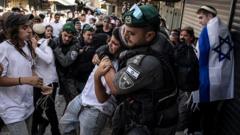This year's Jerusalem Day parade, marking Israel's capture of East Jerusalem, is marred by violence and hate speech, reflecting deep societal divisions amidst ongoing conflict.
Far-Right Violence Erupts in Jerusalem Amid Controversial Jerusalem Day Parade

Far-Right Violence Erupts in Jerusalem Amid Controversial Jerusalem Day Parade
Tensions escalate in Israel as far-right groups march, clashing with Palestinians during Jerusalem Day celebrations.
Crowds of far-right Israelis clashed with Palestinians during an annual Jerusalem Day parade on Monday, which commemorates the Israeli capture of East Jerusalem in the 1967 Arab-Israeli war. The event saw nationalist marchers chanting slogans such as "death to Arabs," while violence erupted in the Old City, intensifying existing tensions. Opposition Leader Yair Lapid condemned the event, calling it a festival of "hatred and racism" that discredits Judaism.
The march gathered thousands of Israelis at Damascus Gate, a crucial entry point to the old city, where they displayed banners proclaiming "67 - Jerusalem in our hands; 2025 - Gaza in our hands." Witnesses reported harassment of local Arab vendors by aggressive marchers, along with chants inciting violence. Israeli police intervened, detaining several individuals as tensions escalated.
National Security Minister Itamar Ben Gvir, addressing the crowd, advocated for harsh penalties against "terrorists" and visited the Al-Aqsa mosque compound, which is a flashpoint for religious tensions. The compound is administered by a Jordanian trust but is visited by Jews under restrictions. A Palestinian presidency spokesperson condemned both the march and Ben Gvir's actions, suggesting they threaten regional stability amid ongoing violence in Gaza.
Israeli Prime Minister Benjamin Netanyahu reiterated the government’s commitment to keep Jerusalem unified under Israeli control. Opposition figures like Yair Golan declared the violence as symptomatic of broader societal issues, calling for unity among different faiths in the city.
Each year, the Jerusalem Day parade culminates at the Western Wall, reinforcing its symbolic significance in Israeli nationalism, but this event coincided with a dramatically escalating conflict in Gaza, where thousands have been killed since a backlash against Hamas’s attacks began in early October. The devastating toll from ongoing hostilities only adds to the complexity of Jerusalem Day, intensifying perceptions of division and discord surrounding the celebration.






















